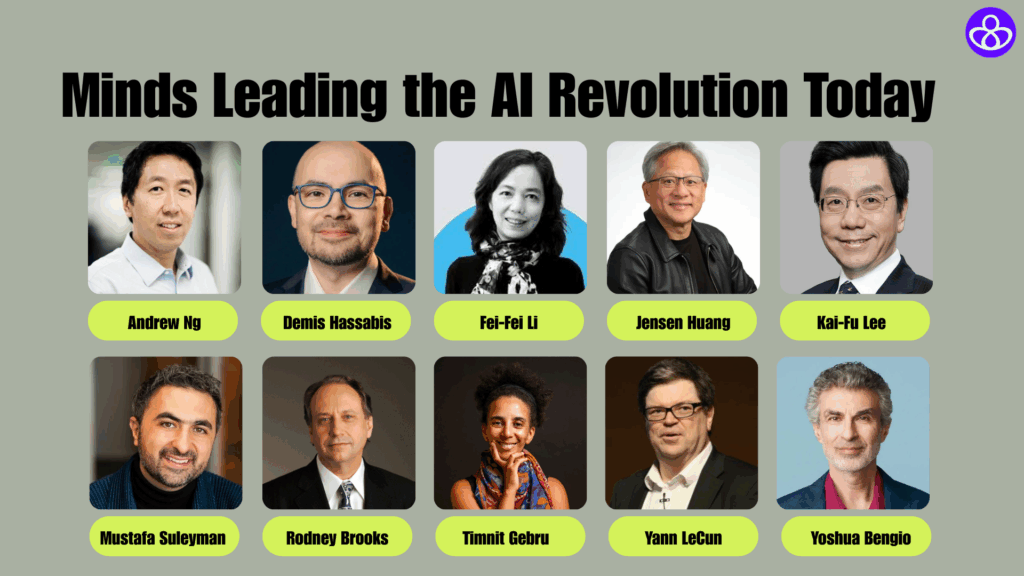Artificial intelligence (AI) is advancing at a breathtaking pace, reshaping industries and societies. In this environment, self-proclaimed “experts” often surface, but true leadership is built on substance: real achievements, vision, and perseverance. Equally, aspiring leaders must not assume AI is closed to them if they lack a specific degree or pedigree. The truth is: AI leadership has many paths and many doors, and the stories of today’s top minds prove it.
To emphasize these two points about the need for substance and accessibility in AI leadership, we present these leaders below, with no specific order and following only an alphabetical order by first name. Their bios remind us that no single path or hierarchy defines leadership in AI, each story carries equal weight in inspiration and impact.
Andrew Ng: Educator Who Democratized AI
Born in London, raised in Asia, and educated at Carnegie Mellon, MIT, and Berkeley, Ng pioneered deep learning applications at Google Brain and led AI research at Baidu. Yet his most lasting contribution may be education. Through Coursera and DeepLearning.AI, he has taught millions. Ng’s career demonstrates that teaching and building communities is as impactful as pushing technical frontiers.
Demis Hassabis: Interdisciplinary Mind Behind DeepMind
Born in London to a Greek Cypriot father and Chinese Singaporean mother, Hassabis was a chess prodigy and game designer before pursuing a PhD in neuroscience. In 2011, he co-founded DeepMind with the mission to ‘solve intelligence.’ Achievements like AlphaGo and AlphaFold show how blending neuroscience and computing can push AI frontiers. Hassabis embodies interdisciplinary innovation—turning curiosity into world-changing impact.
Fei-Fei Li: Godmother of AI and Advocate for Inclusion
An immigrant from China who once worked in her family’s dry-cleaning shop, Fei-Fei Li went on to Princeton, Caltech, and Stanford. She created ImageNet, the dataset that revolutionized computer vision. Beyond research, she co-founded AI4ALL to bring underrepresented youth into AI. Li embodies a human-centered approach—showing that diversity and accessibility are as vital as technical excellence.
Jensen Huang: Hardware Visionary Powering the AI Boom
Co-founder and CEO of NVIDIA, Huang transformed GPUs from gaming hardware into the backbone of deep learning. An immigrant from Taiwan, trained in electrical engineering, Huang foresaw that parallel processing could accelerate AI. His work with CUDA turned NVIDIA into a global AI infrastructure leader. His story proves that AI leadership isn’t just about algorithms—it’s also about building the systems that enable breakthroughs.
Kai-Fu Lee: Bridging East and West in AI
Educated at Carnegie Mellon, Lee led AI work at Apple, founded Microsoft Research Asia, and later ran Google China. Now head of Sinovation Ventures, he invests heavily in Chinese AI startups and advocates for global collaboration, famously contrasting U.S. and Chinese AI strengths in his book AI Superpowers. Lee shows how cultural and entrepreneurial bridges are essential to AI’s global growth.
Mustafa Suleyman: Mission-Driven Entrepreneur
With Syrian and English roots, Suleyman left Oxford to focus on activism before co-founding DeepMind with Hassabis. He later led applied AI projects in healthcare and energy, then launched Inflection AI and joined Microsoft to spearhead new AI initiatives. Suleyman emphasizes AI for real-world problem solving and openly advocates for governance and responsible use.
Rodney Brooks: Robotics Pioneer
An Australian mathematician turned roboticist, Brooks challenged centralized AI models by building practical, distributed systems. His companies iRobot (creator of Roomba) and Rethink Robotics showed that intelligence can be embedded in useful machines. Brooks embodies creativity and boldness, showing that AI leadership can also come from hands-on engineering.
Sam Altman: Entrepreneur Driving AI Mainstream
From creating the startup Loopt, to leading Y Combinator, to co-founding and now running OpenAI, Altman represents the entrepreneurial pathway into AI leadership. Under his watch, OpenAI developed GPT-3 and ChatGPT, tools that brought generative AI into everyday use. His journey demonstrates that a strategic vision, risk-taking, and ecosystem building can matter as much as technical depth.
Timnit Gebru: Ethics and Accountability Advocate
Born in Ethiopia, Gebru earned her PhD at Stanford but made her mark by exposing bias in facial recognition and questioning the risks of large language models. After her controversial exit from Google, she founded the Distributed AI Research Institute (DAIR) and co-founded Black in AI. Gebru proves that leadership is not just building systems but also challenging power to ensure fairness and inclusion.
Yann LeCun: Architect of Convolutional Networks
French-born LeCun invented CNNs, now central to image recognition. From Bell Labs to NYU, to becoming Meta’s Chief AI Scientist, his career bridges foundational research and global deployment. A fellow Turing Award laureate, he now drives research on self-supervised learning. His message to aspiring leaders: master fundamentals, tackle bold problems, and persist through skepticism.
Yoshua Bengio: Deep Learning Pioneer and Ethical Voice
Bengio, born in France to Moroccan-Jewish parents, grew up in Canada and pursued neural networks when few believed in them. Alongside Hinton and LeCun, he is celebrated as a ‘Godfather of AI.’ His persistence earned him the 2018 Turing Award. Today, as head of MILA, Bengio champions not only research but also AI ethics and regulation, reminding us that leadership is about responsibility as much as discovery.
Key Themes Across Leaders
- Diverse backgrounds: Leaders emerged from physics, neuroscience, business, math, and even gaming, proof there is no single ‘correct’ path.
- Persistence through skepticism: Many worked on deep learning when it was unfashionable; their resilience paid off.
- Ethics and responsibility: Leaders like Li, Gebru, Bengio, and Suleyman emphasize AI must serve humanity, not just profit.
- Community and ecosystem building: Ng, Li, and Altman show that enabling others is core to lasting impact.
- Global perspectives: From Ethiopia to Taiwan to France, their journeys reflect AI’s truly international character.
How to Become an AI Leader
Drawing lessons from these pioneers:
1. Develop deep expertise: Whether in coding, neuroscience, ethics, or business, mastery of one domain creates a foundation for leadership.
2. Think across disciplines: Innovation often emerges at intersections, games + neuroscience (Hassabis), hardware + AI (Huang), ethics + technology (Gebru).
3. Balance optimism with responsibility: Pursue bold ideas while confronting risks head-on.
4. Communicate clearly: Complex AI ideas must be explained to broad audiences; Ng’s teaching proves clarity is power.
5. Build ecosystems: Leadership is amplified by enabling others, through education, mentorship, or institution-building.
Conclusion
The AI revolution is still in its early chapters. Presenting these leaders alphabetically by first name underscores an important lesson: there is no hierarchy or single path to leadership in this field. AI welcomes individuals from any corner of the world, immigrants, activists, engineers, entrepreneurs, educators, and ethicists. What unites them is intellectual curiosity, resilience, and commitment to humanity or to other specific causes of their own.
The next great AI leader could be anyone, with passion, preparation, and courage. Perhaps that leader is you.




